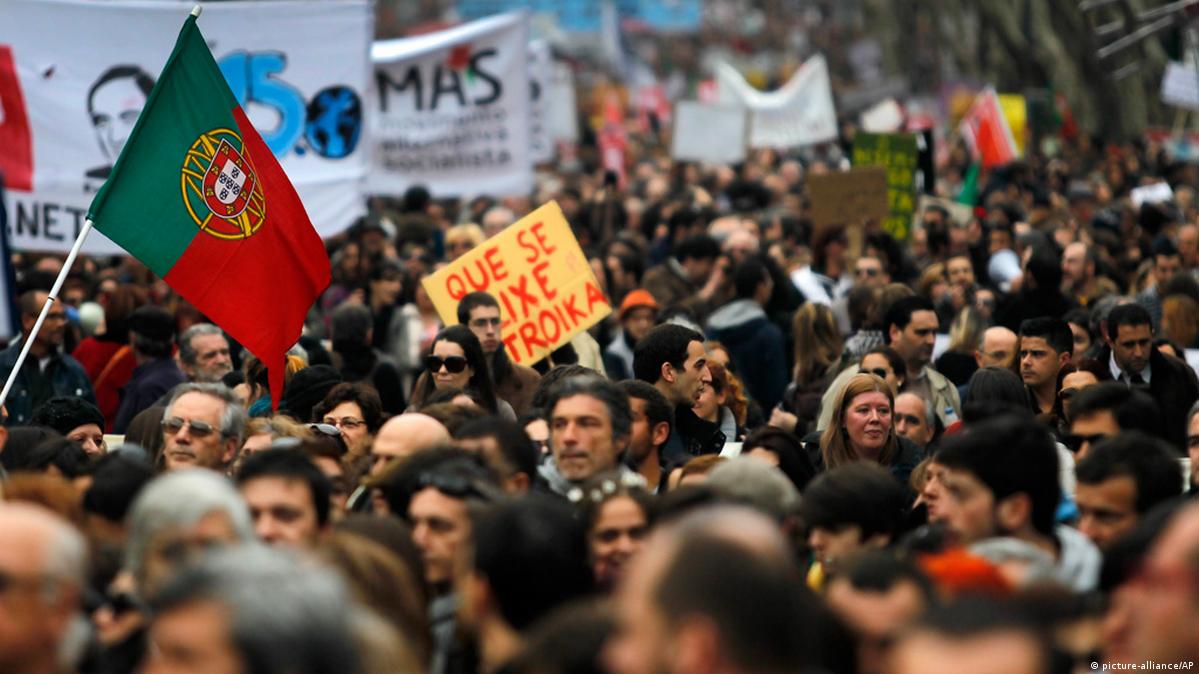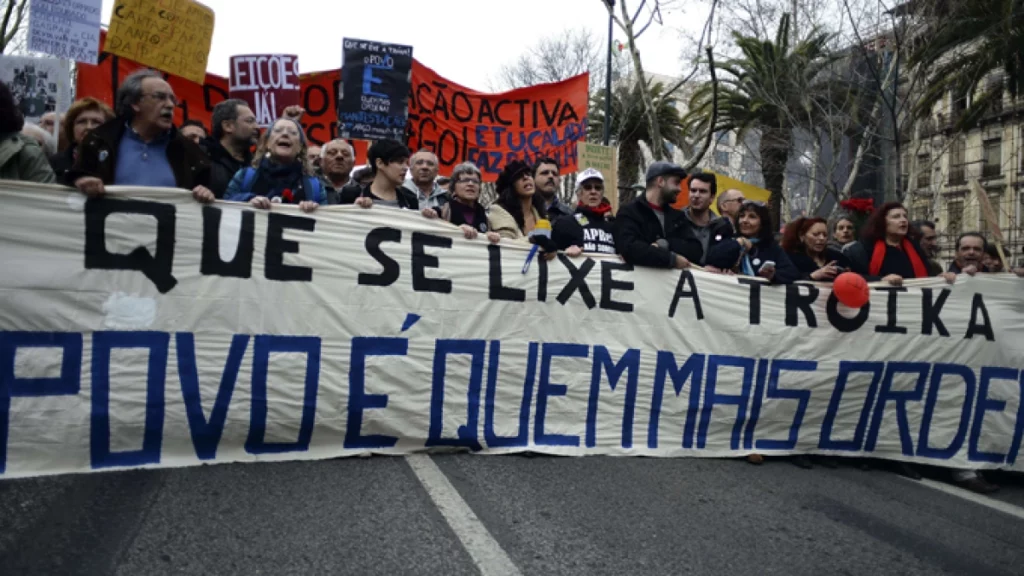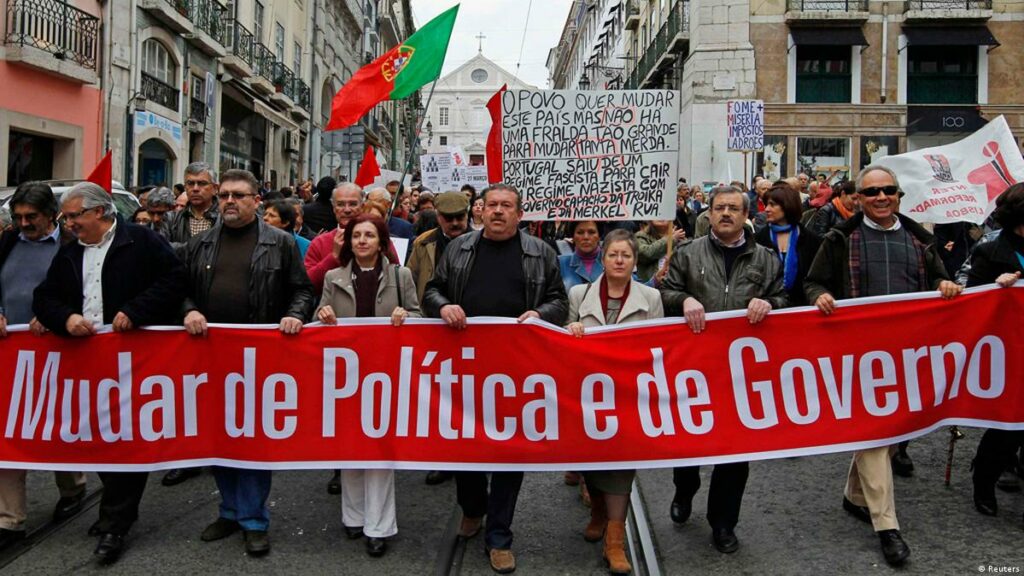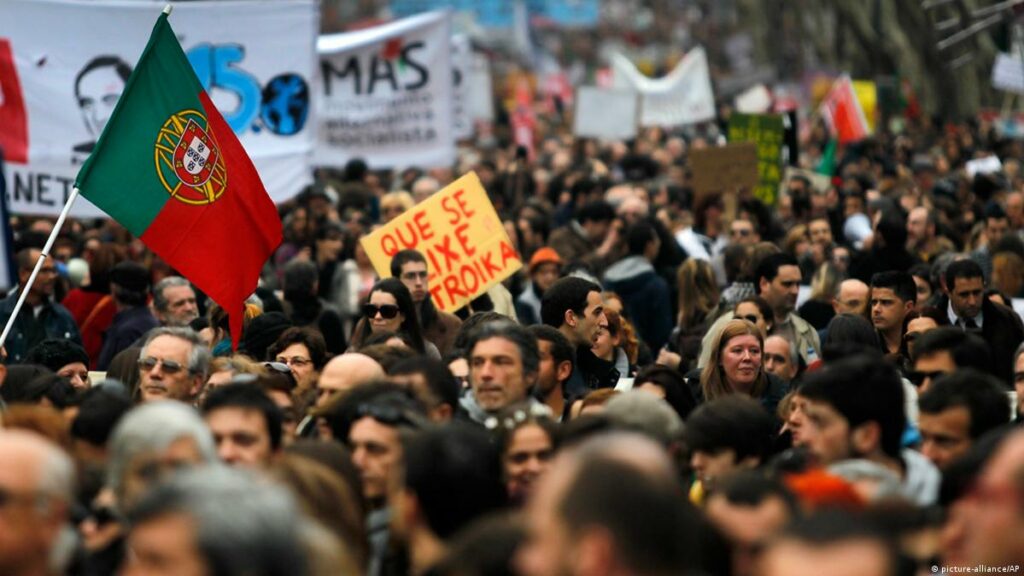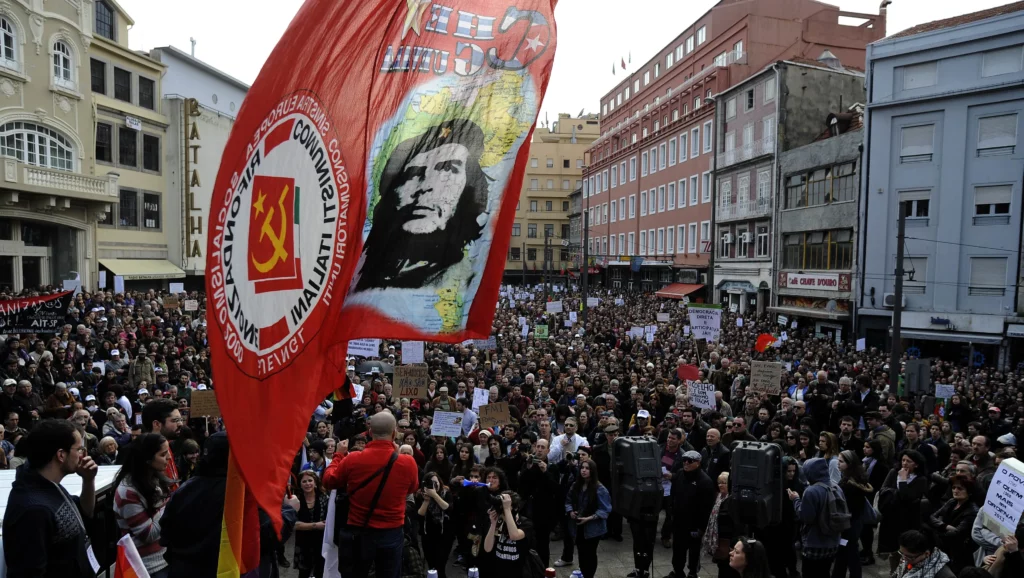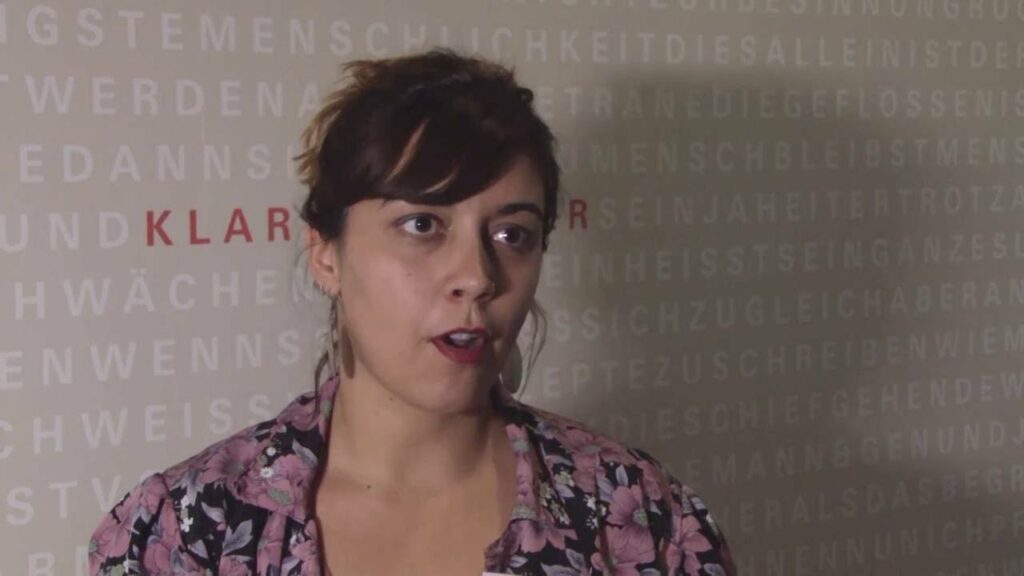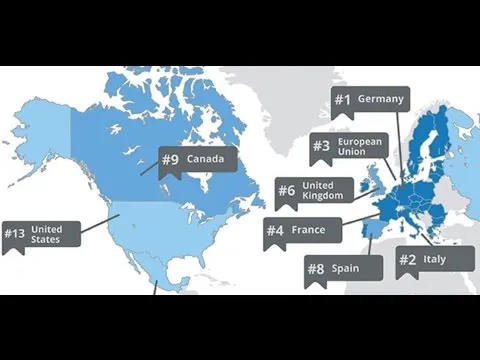This interview was originally published on July 20, 2015. On Reality Asserts Itself, Ms. Principe and Paul Jay discuss building a movement and an electoral strategy and what happened to the mass protests in Portugal.
PAUL JAY, SENIOR EDITOR, TRNN: Welcome back to Reality Asserts Itself on The Real News Network. I’m Paul Jay. We’re continuing our discussion with Catarina Príncipe. We’re talking about the European left, the anti-austerity movement. And we in the previous segments, if you’ve been watching–I hope you will go back and watch them, but we got to a point where there’d been an enormous upsurge in 2012, 2013, a million and a half people on the streets, but not much since. On the contrary, or as a–alternatively, in Greece, the movement grew there and broke through electorally. There’s–of course, they’re facing all kinds of problems, but the movement sustained itself. In Spain, Podemos, another left alliance party/grouping, it looks like it’s poised for an electoral victory. So we’re going to talk a little bit about why that didn’t happen in Portugal, at least so far, and what’s happening in those two places. So thanks for joining us again. So, one more time, Catarina is a social activist from Portugal. She organizes with the Left Bloc in Portugal and Die Linke in Germany, which means The Left. So talk about–I guess, let’s start with Portugal. Like, why didn’t the movement–a million and a half people is a lot of people. Why didn’t it sustain itself? Why didn’t it translate into more electoral support for the Left Bloc? And a little bit of what is that relationship between building a movement and an electoral strategy at the same time.
CATARINA PRÍNCIPE, SOCIAL ACTIVIST: Those are very important questions and not easy to answer. So I think I would say in Portugal I think we have a problem. And the problem is that we did not grow roots. Neither did Bloco, the Left Bloc. Neither did the movements. So we have been active for many years. We’ve done a lot of very important things. But because we–when we’re talking about anti-precarity movement, like we were talking before, what I said was we chose to–.
JAY: Alright, and really quickly, just in case you didn’t hear, anti-precarity movement means people with precarious part-time jobs, freelancers, people who do not have stable, long-term jobs with benefits, even unstable, but at least with benefits and full-time.
PRÍNCIPE: Our choice was to–as I said before, it was a correct political choice at the moment, but we see the problems that it brings today. We chose to organize away from the workplace, right? The same thing with most of the movements. We’re not–like, I think we do have some things to learn from the American left and the American experience. Like, we have very few experience, in Portugal in particular, of community organizing, grassroots organizing. We have very few of that. So we don’t have roots. Neither does the movement.
JAY: Well, you could argue there’s a real problem here in that the left get out of the workplaces, and there’s some community organizing going on, but there’s a real split between what’s actually going on in workplaces, especially unorganized workplaces, where there’s nothing going on, mostly.
PRÍNCIPE: Yeah. Okay. Yeah, for us it’s different, right? It’s both similar and different. So we–the more–like, it’s not that we don’t have organizations in the workplaces. We do, as we were talking about before. They’re just less and less. And the people who are talking about the problems of labor are not organizing in the workplaces but outside. At the same time, the movements have had difficulties of growing roots, because we don’t have a tradition of community organizing in the same sense as, for example, the American left does. So this means that we can have moments of explosion, moments where one and a half million people in a country of not even 10 million people–because this is what we’re talking about; Portugal is a very small country–come out to the streets and protest and then go home because there’s nothing for them to engage with in the next day. Right? So I think this is the central point. And this is what explains, I think, or what helps to–at least one of the things that helps to explain the success of SYRIZA in Greece or what has been until now the success of Podemos in Spain is this going back to the level of daily grassroots politics, not only in the workplace, but in the communities, in the neighborhoods, like, the very important things that have been happening in Greece or Spain, like the movements against the evictions in Spain, for example, which was huge. This is a very important community-level organization, that people, like, have SMSes and they just come to prevent the police to evict a family from a house. This creates links of practical solidarity that grow roots. People actually get to know each other, people that they live in, they–. In Greece, for example, there was also a similar thing against the electricity cuts, where people in their neighborhoods would organize to prevent the people that did not have money to pay electricity, or they would–the neighborhood would organize when the people from the company would come to cut the electricity wires to prevent this from happening. We don’t have those experiences in Portugal. We need them urgently.
JAY: Yeah, in Baltimore, too.
PRÍNCIPE: Yeah. So this is I think something that’s–so this kind of, like, more rooted and at the local level experiences is what fails for us in Portugal and what tends to explain or what is one attempt to explain why so many people show up in demonstrations but then don’t see–you know, demonstrations bring you nowhere, they didn’t–nothing happened, there were general strikes, nothing changed. Okay, so then we go home. Right? So people enter in the cycle of despair and hopelessness.
JAY: Well, maybe you partly answered this, but in Greece, and it looks like in Spain–well, maybe ’cause of the community organizing, but I’m saying it is expressing itself electorally in a way that didn’t seem to in Portugal. The left party never broke through, Left Bloc, the way Podemos and SYRIZA. I mean, people are voting for austerity in Portugal, unless people aren’t turning out and voting at all.
PRÍNCIPE: That is one thing, but this is happening everywhere. But, yeah, 40 percent of the people are not voting in Portugal. That’s a big question. I think left-wing parties, like, radical left-wing parties, so parties that are on the left of the traditional liberalized social democracy, can only make it through when social democracy fails. This is what happened in Greece. So the strategy of building broad left parties in Europe, in Southern Europe in particular, but in Germany also, is to undermine the traditional social democracy because they have turned completely into liberals by gaining their social basis of support, so the people that are still left, but they vote for this party because they see no other option in the horizon, they see, like, we don’t know what to do. So this is the intention with which Bloco in Portugal was formed, which SYRIZA was formed, or Die Linke was formed, or Podemos in a different way, or [incompr.] Podemos was formed. But we can only break through once the liberalized social democracy proves in itself to not play any role anymore. What happened in–.
JAY: So in the United States it would be similar to the Democratic Party being clearly having–.
PRÍNCIPE: Collapsing.
JAY: Collapsing–
PRÍNCIPE: Yeah. Precisely.
JAY: –in terms of its vote.
PRÍNCIPE: What happened in Greece was the socialists, the PASOK, so the liberalized traditional social democracy, went into power and applied austerity. Same thing in Spain. So, of course, the only alternative to this to the left was the new formations. In Portugal, our socialist party has not yet been in government since austerity has been applied. They have been the opposition rhetorically, because if we read their–we’re going to have elections this year, in the end of September. If you read their electoral program, it’s the same as the right-wing party that is in power now. JAY: Accepting all the austerity and conditions and–.
PRÍNCIPE: Everything. Exactly. Exactly the same. But rhetorically they play the role of an oppositional party. So they’re gaining from this. So I think–.
JAY: And they’re likely to win.
PRÍNCIPE: They’re probably going to win, yes. And I think Bloco will maybe be able to make this breakthrough in two or three years once the social basis of the Socialist Party finally understands that there is no way out of austerity with them, because this is what happened in Greece and this is what happened in Spain. So I’m not saying, like, we can all–so I’m saying there’s two things that we need to follow, two directions that we need to follow. On the one hand, we need to grow roots everywhere. And this is happening in Spain with a big social movement. It’s a different process, but in Spain, like, the big social movements that happened with the occupation of the squares, and also very important, like, labor struggles that were called the “citizens waves”, [another language] and all of this, this was the movement that in the end what they realized was we don’t have a voice. We need a party, we need a structure, a political program that unites us and disputes parliament and disputes state power. In Greece, the process is a bit different. The party is there already. The movement and the party go side-by-side, and then they kind of merge. When SYRIZA decides to take part in the solidarity structures in a way that they are not controlling the movement but they decide to support it and to take part in the occupation of the squares in the neighborhood committees to prevent the cuts of the electricity and so on and so forth. So we need to grow roots in this sense, also in Portugal, so to be more present, to build on our daily life on the places where we are, in our schools, in our neighborhoods, in our workplaces. But at the same time, we need an autonomous political program that disputes state power. But I think we can only make this breakthrough once the traditional social democracy proves itself to be unworthy of the trust of the left-wing people that still vote for them.
JAY: In the United States and in Canada, maybe to a little lesser extent in Canada, but I would still say so, but certainly in the U.S., much of the left sees electoral politics as an actual obstacle to building a mass movement, as a distraction from building a mass movement. And one of the sort of better examples of this happening was in Wisconsin, when there was the big upsurge in Wisconsin and there was an occupation of the state assembly buildings. And then the call came for a referendum to recall the governor, and that kind of sidetracked the mass movement into a recall campaign, which wound up being kind of taken over by the Democratic Party, and then left the movement kind of out of air. And, in fact, if I remember correctly, they lost the recall vote. Other people kind of argue that if you don’t have some kind of electoral strategy, there’s no vision for confronting state power. So what do you make of that?
PRÍNCIPE: So I think that–I mean, I don’t want to make a direct comparison between Europe in general or the United States, I mean, because we still–you know, we’re–it’s reduced, but we’re still a democracy. You know, our countries are still democracies, more or less. The United States does not really–you know, in the structure, it’s not really a democracy anymore. So it’s hard to just, like, say–.
JAY: Well, explain that. In what way?
PRÍNCIPE: Because we are–like, to–for example, in the idea of, like, to build a third-party in the United States, which I think is something that is needed urgently.
JAY: And there is a Green Party here. It is running nationally.
PRÍNCIPE: True, but it’s still small and not capable of making it into the ballot box in most states and so on and so forth. Correct?
JAY: I think it would get on the ballot in quite a few places. Of course, the problem–one of the bigger if not the problem here is there is just endless amounts of money for Democratic and Republican parties, you know, in the billions and billions, and it’s very difficult for third parties to raise money.
PRÍNCIPE: But not only to raise money, but actually to make it into somewhere, because in our parliament–.
JAY: ‘Cause the media has also decided–well, first of all, two things. When the media here has decided there are only two parties worth covering ’cause the others can’t win, they pre-decided that. And then, two, the electoral process is winner takes all,–
PRÍNCIPE: Precisely.
JAY: –so there’s no percentage.
PRÍNCIPE: Yeah, that’s why I’m saying it’s not really democratic in that sense anymore, because it’s not–it does not–so if I vote for someone, you know, so if you have a system of the winner takes it all and I vote for someone that in the end ends up not winning, my vote counts in the end nothing, right?
JAY: In much of Europe, including Portugal, if you get 10 percent of the vote, you get 10 percent of the seats.
PRÍNCIPE: Percent of the seats in the parliament, more or less. But yes, basically. So in this sense it is representatively much more democratic. And so, to create a third party or to have a third party is something that can have a very–you know, a short-term outcome, because you can actually make it into parliament. You know, you can actually dispute national politics or at least have a voice.
JAY: One place I think here where you can, especially in mid and smaller sized cities, you can make breakthroughs at the municipal level, and there is possible–in Jackson, Mississippi, they elected a progressive mayor, the city councilor in Seattle. There are some other examples at even the state level occasionally. But I would say even there, much of the left considers that a distraction from movement-building.
PRÍNCIPE: I think it’s not. I find it very hard to dissociate both things. Maybe what I would say is that one of the very important things that we have learned as a movement in southern Europe is that we absolutely need parties. But they just–they are parties of another kind, so to say. They’re not, like, the parties that we mentioned, traditionally very top-down kind of organizations, very bureaucratic, and with a lot of weird structures and leaderships that don’t pay attention to their members and so on and so forth, and that have, like, a skeptical or controlled kind of relation to the movements. So, for example, Bloco in its, like, manifesto, founding paper–.
JAY: This is Left Bloc in Portugal.
PRÍNCIPE: In Portugal, yes. We define ourselves as a party movement and not just as a party. What does this mean exactly? It means, in my opinion, that, or in our opinion that we see the party as an instrument and not as an end in itself, so as an instrument to be like a bullhorn for the movement. But at the same time–and this is, I think, what is very important is that we need collective political programs that can reflect, that can make synthesis. So if I am a queer activist or if I am an activist against climate change or for–an environmental activist, if I’m a labor activist, and if we’re all in our separate movements, we will never get to meet each other, or very seldom we will get to meet each other, and very seldom we will come together in the form of understanding what connects us, what are the commonalities between us, and how does a political program looks like if it reflects the demands of all of these things that are needed to change in society. So that is the role of the party, in my opinion, is to make a synthesis between all those different topics in society, all of those different movements in society, and to link them together, and to make people realize or make people recognize that in the struggle of the other, they can see their own struggle also. So for this we need common political programs. And disputing the state, it doesn’t mean–it can mean–it means different things for people that are inside broad left parties. There’s people who believe in the state. There’s people who want to smash the state. There’s people who believe in a medium-term outcome of, like, okay, we keep the bourgeois state for a while, and then the kind of create dual power. I mean, there’s many different relations to the state. But the question is: if we don’t dispute both the political and the economic centers of power, where actually power is controlling our lives and structuring our lives and preventing us from having more self-determined and free lives, if we’re not disputing these centers of gravity, then we’re not making politics for us all; we’re doing politics only for a small segment of the population. So this is the understanding that although we need movements, we need independent movements, we need movements with their own topics and their own themes. But we need them at certain moments to come together with other movements and to come together in a form of a party that brings them together, makes a political program together, and understands not only how we fight today, but what a society could look like after today, so after tomorrow or in a month.
JAY: Yeah, people need something to fight for.
PRÍNCIPE: Exactly. And perspectives. And I think we can only imagine solutions to this system. I mean, we can imagine a lot of things, but we can only believe in them and we can only make other people believe in them if we act together, because that’s the only way people–. Like, there is this–in Southern Europe we have a very strong narrative to fight against. It’s the narrative of the inevitable. This is inevitable.
JAY: Inevitable. Yeah.
PRÍNCIPE: Inevitable. It’s inevitable. What is happening is inevitable. You have–you know, this is how it goes, and this is what it has to–you know, there’s no other solution.
JAY: Yeah, austerity is the only way there is.
PRÍNCIPE: Is the only way there is. And the only way we can communicate that it is not like this, that there are other things, is when people believe themselves, because they understand it in practice, because they see things changing in practice. I always tell this story about a young woman who came to the anti-precarity movement and organized one of our May Day demonstrations with us from the beginning on. We don’t get money from any party, any structure. We raise our own money, we make our own postcards, leaflets, and so on and so forth. And she said, I didn’t believe this was possible. I didn’t believe this was possible. So I came to see how you did it. And now I understand that if we want and if we come together and if we act together, if we discuss together, it’s actually possible to change things and it’s actually possible to do something new. And this has completely changed my life, she said. And when she said this, I thought, okay, all these years of activism were worth it. But this is the only way we can do it. And so–and I’m talking again at the level of movement. But I think there’s also another thing to a party that I would like to say.
JAY: Okay.
PRÍNCIPE: Not yet.
JAY: Next segment.
PRÍNCIPE: Okay.
JAY: In the next segment, we’re going to talk more about this relationship of party and movement. And we’re also going to talk about a little bit more about the current situation in Portugal. We’re also going to talk a little bit about the current situation in Germany, which is kind of leading the austerity charge across Europe, and just what is the response of the left and workers movement in Germany to all of this. So please join us for the continuation of Reality Asserts Itself with Catarina Príncipe on The Real News Network.
Never miss another story
Subscribe to theAnalysis.news – Newsletter
“Catarina Príncipe is a social movement activist from Portugal and a Jacobin contributing editor.”
